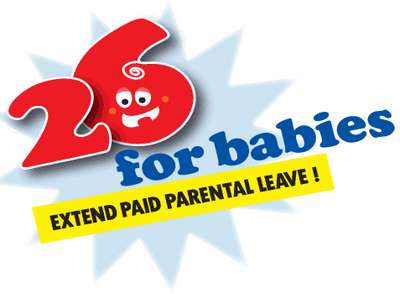Paid Parental Leave Puts Value on Parenting
 Media Release 6 November 2017
Media Release 6 November 2017
Family First NZ is welcoming the government’s commitment to raising paid parental leave to 26 weeks, saying that it recognises and puts a value on the benefit of investing in hands-on parenting for babies, especially in middle- to low-income families. It is also asking whether NZ First’s pre-election policy for paternal leave is part of the package.
“Paid parental leave values mothers and parenting in general. Successive governments have undervalued mothers and the vital role of parents as they bond with their very young children. Early childhood education receives $1.7b taxpayer funding, yet our investment in hands-on parenting in those early crucial formative years has been nowhere near the same investment. Parents can now start to make a real choice,” says Bob McCoskrie, National Director of Family First NZ.
“The political and policy focus has previously been on the needs of the economy, rather than on the welfare of children and the vital role of parents. In reality, this policy would represent about 0.2% of the total government spending, yet research shows that the role of mothers and the early bonding between mums and babies is vital for healthy child development.”
NZ’s Brainwave Trust which was formed as a response to new scientific evidence on the impact that experiences in the first 3 years have on the brain development of a child, says on its website, “The early attachment between parents and their baby creates a foundation for that child’s future relationships with others. Smiling, singing, touching and cuddling as part of attuned, responsive care is necessary to develop this part of the brain. Close, loving physical touch is crucially important. These things allow the child to develop the brain connections needed to feel empathy and care for others – an important prerequisite for healthy functioning as an adult.”
Family First is now asking whether NZ First will deliver their pre-election promise of paid leave for fathers of two weeks rising to four weeks. According to the latest OECD report, on average, OECD countries offer nine weeks of paid father-specific leave.
“Research is also showing us that it is important that fathers be actively involved with their children and are not an optional extra. Fathers are fundamental to children’s healthy development as their involvement can improve the health, emotional well-being and educational achievement of their children. That’s why we made the call for a small amount of paid father leave also.”
“The role of parents during the crucial early years of a child should be acknowledged. Families should not be pressured to return to work simply because of financial concerns, and the Parental Leave scheme and other family tax breaks such as Income Splitting and the removal of marriage penalty taxes should support and strengthen families with young children.”
A nationwide poll of New Zealanders in 2013 commissioned by Family First NZ found 68% support for paid paternal leave of two weeks for fathers. Interestingly, there was slightly stronger support from women.
ENDS






